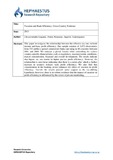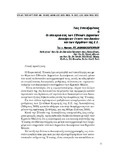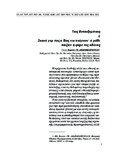Articles: Recent submissions
Now showing items 341-360 of 423
-
Taxation and Bank Efficiency: Cross-Country Evidence
(Taylor & Francis, Ltd., 2013)This paper investigates the relationship between the effective tax rate on bank income and bank profit efficiency. Our sample consists of 3,472 observations from 533 publicly quoted commercial banks operating in 46 countries ...
-
Optimal long-run inflation and the New Keynesian model
(Elsevier, 2012-08)Central banks typically have a long-run inflation target that is modestly positive. However, the standard New Keynesian framework prescribes that zero inflation is the optimal longrun target. In this paper, we show that ...
-
Volatility Spillovers and Price Interdependencies; A Dynamic non Parametric Approach
(International Research Journal of Finance and Economics, 2010)This paper investigates the volatility spillovers of four major equity markets using a new approach namely, the Filtered Historical Simulation approach (FHS). The FHS captures very effectively the changes ...
-
Portfolio selection under VaR constraints
(Springer-Verlag, 2005-03)In this paper we show that by assuming a constant variance/covariance matrix over the holding period, the VaR limits can often be exceeded within the relevant horizon period. To minimize this risk, we formulate the problem ...
-
Stability properties of general systems
(Society for General Systems Research, 1973)The system approach views any organized entity as a unity composed of interdependent parts capable of sensitive and accurate interaction among themselves and with their environment. It is the mutual interaction among ...
-
The second law of systems
(Taylor & Francis, 1977)This paper asserts that the Second Law of Thermodynamics (SLT) despite holding truc in ail laboratory tests heretofore conducted, cannot, by itself, explain the hierarchical universe. By examination of the existing evidence, ...
-
On the synthesis of general systems
(Society for General Systems Research, 1971)In Part I, we extended the work of Ashby [1,2] to develop an analytical framework for determining the relation betweén system size and system stability. It was established that, for linear dynamic systems, as the number ...
-
On the synthesis of general systems
(Society for General Systems Research, 1971)The concept of a system has been identified in a large number of disciplines; biology, management science, economics, sociology, political science, theology, law, etc., have profited by the apparatus associated with ...
-
Sampling distributions of post-sample forecasting errors
(Wiley, 1989)Forecasting errors fall in two clearly different categories: (a) the residual errors from fitting a model to the available data and (b) the post-sample forecasting errors. The emphasis of statistical theory and forecasting ...
-
Τοις εντευξομένοις ή Περι Εθνικής Κρίσης και κρίσης Αξιών
(Κέντρο Επιμόρφωσης Μελετών Έρευνας και Ανάπτυξης, 2015)
-
Τοις εντευξομένοις ή Περί Ανεξαρτήτων Αρχών
(Κέντρο Επιμόρφωσης Μελετών Έρευνας και Ανάπτυξης, 2015)
-
Strategic business forecasting
(Elsevier, 1996)First, it is practically oriented. It avoids theoretical, and mathematical discussions. It directly gets into how to use it, when to use it, what it is used for, and what resources are required of it. It includes many ...
-
Τοις εντευξομένοις ή Οι υποχρεώσεις των Εθνικών Δημόσιων Διοίκησεων έναντι του Δικαίου και των Οργάνων της Ε.Ε.
(Κέντρο Επιμόρφωσης Μελετών Έρευνας και Ανάπτυξης, 2015)
-
Think lucky
(2009)Strategy theories make great claims about their ability to contribute to business success, but how realistic are those claims? We only have to look back to re engineering and its promised miracles, for a lesson in how far ...
-
"Forecasting: its role and value for planning and strategy"
(Elsevier, 1996)First i would like to thank the commentators for their excellent and well thought comments on my paper. I believe that there is little disagrement between their views and mine. All commentators, with the possible exception ...
-
Τοις Εντευξομένοις ή Σκηνή γαρ πας ο βίος και παίγνιον΄ή μάθε παίζειν ή φέρε τας οδύνας.
(Κέντρο Επιμόρφωσης Μελετών Έρευνας και Ανάπτυξης, 2014)
-
Τοις Εντευξομένοις ή Περί της ειδικώτερης σχέσης του Εθνικού Συντάγματος και δικαίου της Ε.Ε.
(Κέντρο Επιμόρφωσης Μελετών Έρευνας και Ανάπτυξης, 2013)
-
The value of empirical work: A personal view
(Elsevier, 1993)When I compare the field of forecasting with other social science disciplines I see a major advantage. We have the ability to empirically test the validity of our theories and find out the methods/ models that provide ...
-
If we cannot forecast how can we plan?
(Elsevier, 1981)The purpose of this article is to deal directly and explicitly with the issues and problems currently facing forecasting, planning and strategy and to discuss how the challenges of the 1980s can be realistically and ...
-
Decision making and planning under low levels of predictability
(Elsevier Ltd, 2009)This special section aims to demonstrate the limited predictability and high level of uncertainty in practically all important areas of our lives, and the implications of this. It summarizes the huge body of solid empirical ...




















